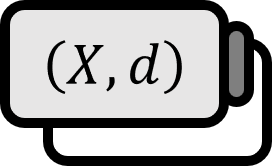Uniform Continuity in Metric Spaces
Definition1
Given two metric spaces $(X, d_{X})$, $(Y, d_{Y})$ and a sequence of functions $\left\{ f_{n} : X \to Y \right\}$. If for every $\varepsilon \gt$ there exists $\delta (\varepsilon) \gt 0$ satisfying the following condition, then the sequence $\left\{ f_{n} \right\}$ is called equicontinuous.
$$ \forall x_{1}, x_{2} \in X \text{ and } f_{n}\quad d_{X}(x_{1}, x_{2}) \lt \delta (\varepsilon) \implies d_{Y} \big( f_{n}(x_{1}), f_{n}(x_{2}) \big) \lt \varepsilon $$
Explanation
Simply put, equicontinuous $\left\{ f_{n} \right\}$ refers to a sequence that gathers functions among uniformly continuous functions in $X$ which hold continuity for the same $\varepsilon$ and $\delta (\varepsilon)$.
Ascoli’s Theorem
A bounded equicontinuous sequence of functions $\left\{ f_{n} \right\}$ has a converging subsequence.
Erwin Kreyszig, Introductory Functional Analysis with Applications (1978), p454 ↩︎
